
Luxembourg, also known as Luxembourg City, is the capital city of Luxembourg and the country's most populous commune. Standing at the confluence of the Alzette and Pétrusse rivers in southern Luxembourg, the city lies at the heart of Western Europe, situated 213 km (132 mi) by road from Brussels and 209 km (130 mi) from Cologne. The city contains Luxembourg Castle, established by the Franks in the Early Middle Ages, around which a settlement developed.
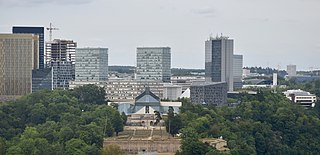
Kirchberg is a quarter in north-eastern Luxembourg City, in southern Luxembourg. It consists of a plateau overlooking the north-east of the historical city center, Ville Haute, connected to the rest of the elevated city by the Grand Duchess Charlotte Bridge, which spans the Pfaffenthal valley. It is often referred to, in reference to the geographical feature it inhabits, as the Kirchberg plateau by Luxembourgish residents. Kirchberg is the predominant location of the European Union institutions and bodies based within Luxembourg, and is sometimes used as a metonym for the EU's judiciary, which occupies the quarter. It is thus the central business district of Luxembourg.
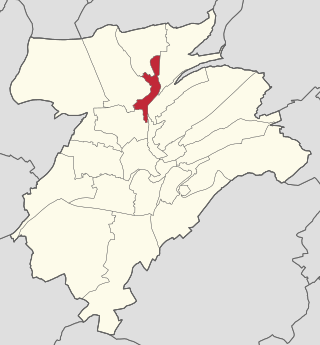
Eich is a quarter in northern Luxembourg City, in southern Luxembourg.

Hollerich is a quarter in south-western Luxembourg City, in southern Luxembourg.
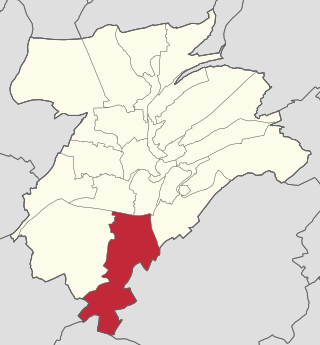
Gasperich is a quarter in southern Luxembourg City, in southern Luxembourg.

Pfaffenthal is a quarter in central Luxembourg City, in southern Luxembourg. The quarter owes its name to the German words Pfaffen, meaning monk, and Tal, meaning valley, as the area was once administered by the Benedictine Abbey in Altmunster. During the Middle Ages, this site was popular with craftsmen and artisans, who used the Alzette River to aid in their work. The site is a strategically important gateway to Luxembourg City, and was thus repeatedly fortified by successive rulers from about the fourteenth to eighteenth centuries.

Limpertsberg is a quarter in north-western Luxembourg City, in the centre of Luxembourg.

Cessange is a quarter in south-western Luxembourg City, in southern Luxembourg.

Grund is a quarter in central Luxembourg City, in southern Luxembourg. It is located in the valley below the centre of Luxembourg City on the banks of the Alzette river. In addition to being a picturesque area, it is a popular nightlife precinct which can be accessed by foot or via a lift which descends through the cliff.

Muhlenbach is a quarter in north-western Luxembourg City, in southern Luxembourg.

Cents is a quarter in eastern Luxembourg City, in southern Luxembourg.

Belair is a quarter in western Luxembourg City, in southern Luxembourg.
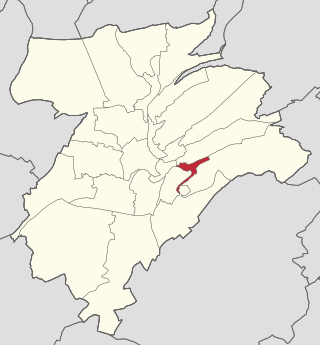
Pulvermuhl is a quarter in eastern Luxembourg City, in southern Luxembourg.
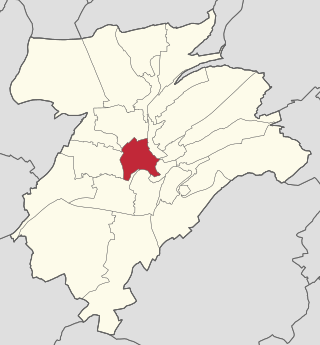
Ville Haute is a quarter in central Luxembourg City, in southern Luxembourg. It is the historic center of Luxembourg City and is involved in its UNESCO World Heritage Site status. As of 31 December 2024, Ville Haute has a population of 3,449 inhabitants.
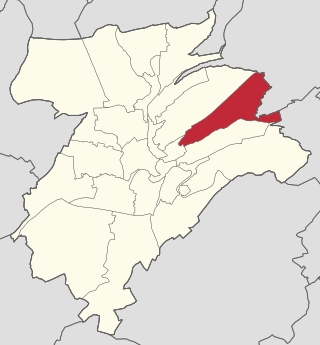
Neudorf-Weimershof is a quarter in eastern Luxembourg City, in southern Luxembourg.

South Bonnevoie is a quarter in south-eastern Luxembourg City, in southern Luxembourg. Within the quarter lies most of the area of Bonnevoie, which also forms part of North Bonnevoie-Verlorenkost.

North Bonnevoie-Verlorenkost is a quarter in southern Luxembourg City, in southern Luxembourg. Within the quarter lies some of the area of Bonnevoie, most of which lies in the quarter of South Bonnevoie.

Luxembourg railway station is the main railway station serving Luxembourg City, in southern Luxembourg. It is operated by Chemins de Fer Luxembourgeois, the state-owned railway company. 80,000 passengers use this station every day.

Avenue de la Liberté is a street in the Gare quarter of Luxembourg City, Luxembourg. Following significant alterations to its layout during renovation works, which occurred between 2018 and 2021, the avenue is separated into a dedicated bidirectional two-lane tramway on its eastern-side, followed by a two-lane one-way arterial road for motor vehicle traffic heading south towards Luxembourg station, and a bidirectional dedicated cycle-path on its western-side. All this is flanked by two wide tree-lined paved pedestrian footpaths. Prior to the works, which formed part of Luxembourg City's efforts to reintroduce tram transport, the avenue was a four-lane arterial road for motor vehicles with a one way designation for all traffic, excepting public buses.

Pfaffenthal-Kirchberg railway station is a rail station on CFL Line 10, in the north of Luxembourg City which opened in December 2017. It is located on Rue Saint-Mathieu in the Pfaffenthal valley, below the Grand Duchess Charlotte Bridge, overlooking the Alzette River. The Société Nationale des Chemins de Fer Luxembourgeois (CFL), the state-owned rail company, operates both the station and the associated funicular line, which links the station to the Kirchberg plateau.

























